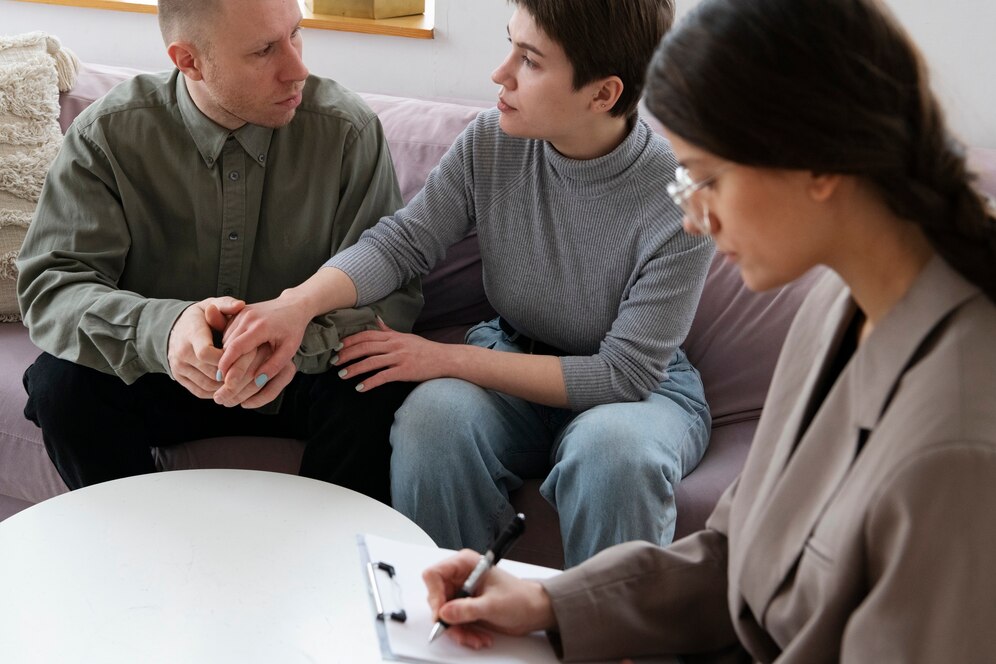Couples Rehab in Hartford, Connecticut
Addiction is a formidable challenge, especially when it affects both partners in a relationship. However, couples rehab offers a unique and supportive approach to overcoming substance abuse together. If you and your partner are seeking treatment in Hartford, Connecticut, this comprehensive guide will provide you with valuable insights, expert opinions, and actionable tips to make informed decisions. From detox to relapse prevention, explore how couples rehab in Hartford, CT, can help you and your partner achieve lasting recovery.
Understanding Couples Rehab
What is Couples Rehab?
Couples rehab is a specialized form of addiction treatment designed for couples who are struggling with substance abuse. Unlike traditional rehab programs, couples rehab focuses on both individual and joint therapy sessions, addressing the dynamics of the relationship alongside addiction issues. This holistic approach aims to foster mutual support and accountability, enhancing the recovery process. Learn more about couples rehab programs in Connecticut by contacting our helpine now.
Benefits of Couples Rehab
- Mutual Support: Couples rehab allows partners to support each other through the recovery process, creating a shared commitment to sobriety.
- Improved Communication: Therapy sessions often focus on improving communication skills, which can help strengthen the relationship.
- Relapse Prevention: By learning to navigate triggers and stressors together, couples can develop strategies to prevent relapse.
Why Choose Couples Rehab in Hartford, CT?
The Appeal of Hartford, CT
Hartford, Connecticut, offers a serene environment conducive to recovery. Known for its vibrant culture, historical significance, and beautiful landscapes, Hartford provides a peaceful backdrop that can be incredibly beneficial for those undergoing addiction treatment. Additionally, the city is home to several reputable drug and alcohol rehab centers for couples.
Accessibility and Convenience
Choosing a couples rehab in Hartford, CT, means you can benefit from the convenience of being close to home while accessing high-quality treatment. This can be especially important for couples with family or work obligations.
Key Components of Couples Rehab in Hartford, CT
Comprehensive Detox Programs
Detoxification is often the first step in the recovery process. Hartford, CT couples rehab with detox facilities offer medically supervised detox programs to safely and comfortably cleanse the body of harmful substances. This crucial phase sets the foundation for effective therapy and treatment.
Individual and Joint Therapy Sessions
Effective couples rehab programs combine individual counseling with joint therapy sessions. Individual therapy focuses on personal issues related to addiction, while joint sessions address relationship dynamics, communication skills, and mutual support. This dual approach ensures that both partners receive the care and attention they need.
Medication-Assisted Treatment (MAT)
For some couples, Medication-Assisted Treatment (MAT) is a crucial component of their recovery plan. MAT combines medications with counseling and behavioral therapies to treat substance use disorders. Couples rehab centers in Hartford, CT, offer MAT options tailored to the specific needs of each couple, ensuring a comprehensive approach to recovery.
Holistic Treatment Options
Holistic couples drug rehab in Hartford, CT, emphasizes treating the whole person—body, mind, and spirit. These programs often include alternative therapies such as yoga, meditation, acupuncture, and nutritional counseling, providing a well-rounded approach to recovery. Holistic treatments can help couples develop healthier lifestyles and coping mechanisms.
Relapse Prevention Programs
Relapse prevention is a critical aspect of any successful rehab program. Couples rehab centers in Hartford, CT, offer comprehensive relapse prevention programs that equip couples with the tools and strategies needed to maintain sobriety long-term. These programs often include ongoing counseling, support groups, and aftercare planning.
Is Couples Rehab Right for You?
Assessing Your Needs
Deciding if couples rehab is right for you involves assessing your specific situation and needs. Consider factors such as the severity of your addiction, the state of your relationship, and your willingness to undergo joint therapy. Couples rehab can be highly effective for those who are committed to supporting each other through the recovery process.
Expert Opinions
Addiction experts often emphasize the importance of a supportive environment in the recovery process. Dr. Jane Smith, a leading addiction specialist, notes, “Couples who enter rehab together often have a unique bond that can be a powerful motivator for recovery. The key is to ensure that both partners are equally committed to the process.”
Choosing the Right Couples Rehab in Hartford, CT
Research and Reviews
Start by researching drug and alcohol rehab centers for couples in Hartford, CT. Look for facilities with positive reviews and testimonials from past clients. Pay attention to the programs they offer, their success rates, and the qualifications of their staff.
Facility Tours
If possible, visit potential rehab centers to get a feel for their environment and facilities. A tour can help you assess the amenities, the quality of care, and the overall atmosphere of the center. This can be particularly important for those considering Hartford, CT luxury couples rehab options.
Consultation with Experts
Speak with addiction treatment experts to get their recommendations and insights. They can provide valuable guidance on which programs may be best suited for you and your partner’s needs.
Actionable Tips for a Successful Rehab Experience
Stay Committed
Recovery is a challenging journey that requires commitment and perseverance. Stay dedicated to the process and support each other through the ups and downs.
Utilize Support Systems
Take advantage of the support systems available to you, including counselors, support groups, and aftercare programs. These resources can provide additional guidance and encouragement.
Focus on Communication
Effective communication is crucial in both your recovery and your relationship. Practice open, honest communication and actively listen to your partner’s concerns and needs.
Embrace Healthy Habits
Incorporate healthy habits into your daily routine, such as regular exercise, balanced nutrition, and mindfulness practices. These habits can enhance your overall well-being and support your recovery journey.
Plan for the Future
Develop a comprehensive aftercare plan to help maintain your sobriety once you complete the rehab program. This plan should include ongoing counseling, support group meetings, and strategies for managing triggers and cravings.
Find Help
Couples rehab in Hartford, Connecticut, offers a unique and effective approach to overcoming addiction and rebuilding healthier relationships. With a range of treatment options, including detox programs, medication-assisted treatment, and holistic therapies, couples can find the support they need to recover together. By choosing the right rehab center, staying committed to the process, and utilizing available resources, you and your partner can achieve lasting sobriety and a stronger, more supportive relationship.
FAQs
What is couples rehab?
Couples rehab is a specialized form of addiction treatment designed for couples who are struggling with substance abuse. It combines individual and joint therapy sessions to address both personal and relationship issues related to addiction. Learn more about couples rehab by visiting https://couplesrehabs.org/contact-us/
How long does couples rehab typically last?
The duration of couples rehab can vary depending on the severity of the addiction and the specific needs of the couple. Programs typically range from 30 to 90 days, with some offering extended care options.
Can couples rehab help with co-occurring mental health disorders?
Yes, many couples rehab centers offer integrated treatment for co-occurring mental health disorders. This approach ensures that both addiction and mental health issues are addressed simultaneously.
What if one partner is more committed to rehab than the other?
It’s important for both partners to be equally committed to the rehab process for it to be effective. Couples therapy sessions can help address any discrepancies in commitment and work towards a mutual understanding.
Are there luxury rehab options available in Hartford, CT?
Yes, Hartford offers luxury couples rehab options that provide high-end amenities and personalized care. These facilities focus on creating a comfortable and supportive environment for recovery.
Local Resource Links
City Resources
- Hartford Health Department: https://www.hartfordct.gov/government/health-department
- Hartford Community Services: https://www.hartfordct.gov/government/community-services
- Hartford Substance Abuse Programs: https://www.hartfordct.gov/government/substance-abuse
State Resources
- Connecticut Department of Public Health: https://portal.ct.gov/DPH
- Connecticut Substance Abuse Helpline: https://www.ct.gov/dmhas/cwp/view.asp?a=2902&q=335206
- Connecticut Behavioral Health Partnership: https://www.ctbhp.com/
County Resources
- Hartford County Health Department: https://www.hartfordct.gov/government/health-department
- Hartford County Community Services: https://www.hartfordct.gov/government/community-services
- Hartford County Behavioral Health Resources: https://www.hartfordct.gov/government/behavioral-health
Health Resources:
- Hartford Department of Health and Human Services
- Website: Hartford Health Department
- Description: Provides a range of health services, including public health initiatives, vaccinations, and health education.
- Community Health Services (CHS)
- Website: Community Health Services
- Description: Offers comprehensive primary care, dental, and behavioral health services to individuals and families in Hartford.
- Saint Francis Hospital and Medical Center
- Website: Saint Francis Hospital
- Description: A leading healthcare provider in Hartford offering emergency care, specialty services, and community health programs.
Mental Health Resources:
- Capitol Region Mental Health Center
- Website: Capitol Region Mental Health Center
- Description: Provides a wide range of mental health services, including outpatient treatment, crisis intervention, and community support programs.
- Connecticut Behavioral Health Partnership (CTBHP)
- Website: CT Behavioral Health Partnership
- Description: Offers mental health and substance use disorder services for Medicaid recipients, focusing on children and families.
- Hartford Behavioral Health
- Website: Hartford Behavioral Health
- Description: Delivers mental health and substance use treatment services, including individual therapy, family counseling, and psychiatric evaluations.
Drug Abuse Resources:
- Connecticut Community for Addiction Recovery (CCAR)
- Website: CCAR
- Description: Provides recovery coaching, telephone recovery support, and recovery community centers to support individuals in recovery from addiction.
- Rushford Center
- Website: Rushford Center
- Description: Offers comprehensive addiction treatment services, including detoxification, inpatient and outpatient rehab, and medication-assisted treatment.
- InterCommunity Health Care
- Website: InterCommunity Health Care
- Description: Provides integrated primary care and behavioral health services, including substance abuse treatment and mental health counseling.
Additional Resources:
- Connecticut Department of Mental Health and Addiction Services (DMHAS)
- Website: DMHAS
- Description: The state agency responsible for providing comprehensive mental health and addiction services, including prevention, treatment, and recovery programs.
- United Way of Connecticut 2-1-1
- Website: 2-1-1 Connecticut
- Description: A free, confidential service that helps people find local resources for health, mental health, and substance abuse treatment.
These resources provide a wide range of support for individuals and couples seeking help for health, mental health, and addiction issues in Hartford, CT. By utilizing these services, residents can access the care they need to improve their well-being and recovery.
Top 10 questions and answers about Couples Rehab programs in Hartford
4o













Recent Comments